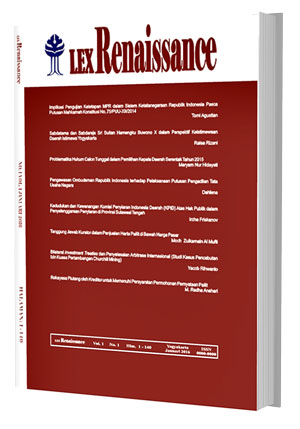Main Article Content
Abstract
Abstract
Problems in the study: first, how the effectiveness of the supervision of the Regional Supervisory Council
(MPD) Yogyakarta on behavior according Notary Notary Code? Second, whether the sanctions provided by
the Regional Supervisory Council (MPD) of Yogyakarta to the Notary Public who Notary Code violations. To
answer these problems juridical empirical research by reviewing the primary data and secondary data were
analyzed descriptively. The study concluded, first, the implementation of supervision by the Supervisory
Council of City of Yogyakarta have been effective because it is consistent with the supervision of working
procedures of the Regional Supervisory Council. While Supervision and inspection of Notary conducted by
the Supervisory Council, in which there are elements of Notaries , thereby at least Notary supervised and
examined by the Supervisory Council members are definitely better understand the world Notary. Secondly,
a notary who commit violations of the Code, the Honorary Board in coordination with the Council of Regional
Supervisor will check such violations, and may impose sanctions on violators, sanctions imposed upon
members of the Indonesian Notary Association who violates the Code of Conduct, according to Article 6 of
the Notary Code, namely form: 1. Reprimand; 2. Warning; 3. Schorzing (temporary dismissal) of the
membership associations; 4. Onzetting (dismissal) of the membership associations; 5. Dismissal with no
respect from the membership association.
Keywords: Development and Supervision
Article Details
Authors who publish with this journal agree to the following terms:
a. Authors retain copyright and grant the journal right of first publication with the work simultaneously licensed under a Creative Commons Attribution License that allows others to share the work with an acknowledgement of the work's authorship and initial publication in this journal.
b. Authors are able to enter into separate, additional contractual arrangements for the non-exclusive distribution of the journal's published version of the work (e.g., post it to an institutional repository or publish it in a book), with an acknowledgement of its initial publication in this journal.
c. Authors are permitted and encouraged to post their work online (e.g., in institutional repositories or on their website) prior to and during the submission process, as it can lead to productive exchanges, as well as earlier and greater citation of published work (See The Effect of Open Access).



